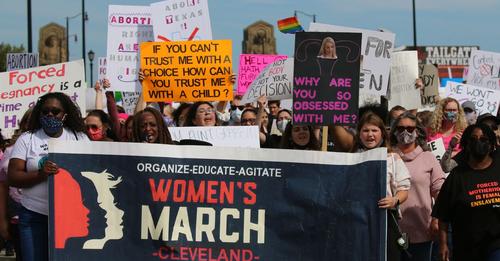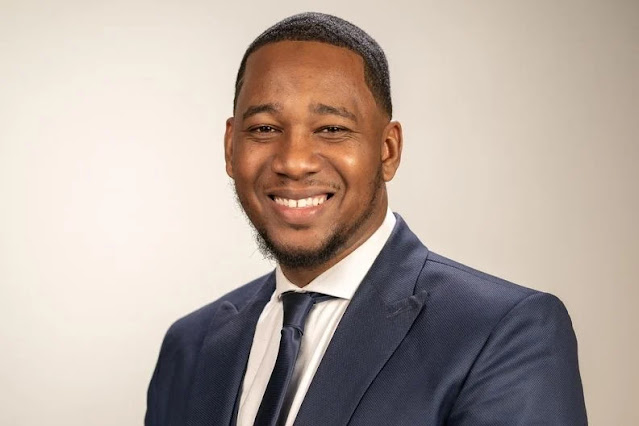Supreme Court hears oral arguments as to Texas' six-week abortion ban...Women's March Cleveland will march again in Cleveland in January of 2022 for its anniversary march after thousands marched in Cleveland on October 2 against the Texas abortion ban and anti-abortion bills in Ohio and elsewhere.....There will be hundreds of marches nationwide in January of 2022 for the anniversary of Women's March...."We have unfinished business in Cleveland, Ohio regarding abortion access and the reproductive and Civil Rights of women and will continue to demand public policy changes and protest in the streets for public policy changes and until are demands are met," said Women's March Cleveland head organizer Kathy Wray Coleman, a Cleveland activist and organizer who organize Cleveland's Oct 2 march, and others.....By Clevelandurbannews.com and Kathywraycolemanonlinenewsblog.com, Ohio's Black digital news leader
Women's March Cleveland head organizer Kathy Wray Coleman, pictured second from left behind the Women's March Cleveland banner, leads thousands of women across the Carnegie Bridge in Cleveland, Ohio on Sat., Oct 2. Cleveland's march drew thousands and was one of the largest marches in the country. It was also was one of more than 600 sister marches held nationwide on Oct. 2 under the umbrella of Women's March National to protest recent attacks on abortion and reproductive rights by Republican-dominated state legislatures across the country, including in Texas and Ohio. The U.S. Supreme court on Mon., Nov 1 heard oral arguments relative to a state law passed by the Texas state legislature earlier this year that bans abortion after six weeks of pregnancy, and regardless of rape or incest. Every mainstream media outlet in Cleveland covered the event (Photo by David Petkiewicz Photography of Cleveland.com)
WASHINGTON, D.C- As pro-abortion protesters, led by Women's March National and a host of other reproductive freedoms advocates, picketed outside of the courthouse in Washington D.C. Monday afternoon, a divided U.S. Supreme Court heard oral arguments from both sides relative to the bizarre state law passed by the Texas state legislature earlier this year that bans abortion after six weeks of pregnancy, and regardless of rape or incest. (Editor's note: The Supreme Court will hear oral arguments in a Mississippi abortion case on Dec. 1).
The Supreme Court's review of the Texas law, which has been in effect for roughly two months, is whether the federal court has jurisdiction over challenges to the Texas state law and not whether it violates Roe v. Wade, the landmark 1973 Supreme Court decision that made abortion legal nationwide.
Alexis McGill Johnson, national president of Planned Parenthood, told CNN on Monday that she was encouraged by the demeanor of the nine justices during oral argument, even though the court is largely conservative.
"We were encouraged that the court seemed genuinely troubled by Texas' blatant attempt to enact an unconstitutional law and to evade judicial review by doing so," said McGill Johnson, who is Black. "
Justice Helena Kagan, an Obama appointee and part of the liberal arm of the court, questioned whether the Texas state law's disregard of Roe v Wade's constitutional mandate for abortion access operates against "the broader principal that states are not to nullify federal constitutional rights." And Justice Alito addressed the decline in abortions in Texas over the past year at 50 percent and asked if 'some abortions have been chilled' because of the new law, which in addition to banning abortions after six weeks, allows any person to sue anyone who performs or aids in an abortion.
Nonetheless, the justices will determine in this case a jurisdictional issue, which means they will never reach the merits of the case and must decide if the federal court venue is the proper place for the dispute over the state law at issue to be heard.
The controversial Texas abortion law, Senate Bill 8, and similar proposed legislation like it that has since popped up in at least a half dozen states nationwide, drew thousands of women to protest in the streets on Oct 2, including in major American cities such as Los Angeles, Atlanta, Detroit, Louisville, Sacramento, Phoenix and in all of Ohio major cities of Cleveland, Columbus, Cincinnati, Dayton and Youngstown,
Cleveland had the largest march in Ohio and one of the largest in the country, and was one of more than 600 sister marches nationwide under the umbrella of Women's March National, which hosted its march of thousands on Freedom Plaza in Washington, D.C., the nation's capital. Some 90 other organizations, including Planned Parenthood and Naral Pro-Choice were also part of the protest activities.
Cleveland police predicted that more than 2,000 people were there, the largest crowd of protesters in Cleveland since the George Floyd rally in May of 2020, and certainly one of the biggest nationwide since the still raging coronavirus pandemic hit the U.S. with a vengeance in the winter of 2020
All of Cleveland's major media covered the gathering, including local television stations channel 5, 19, 3, Fox 8 and Spectrum local news as well as Cleveland. com and the Plain Dealer, Scene Magazine, and the Call and Post Newspaper, a Black print weekly distributed in Cleveland, Columbus and Cincinnati.
"We marched on Oct 2 in Cleveland with thousands over the actions by state legislatures in Texas, Ohio and elsewhere in trampling upon our reproductive freedoms as women and abortion access without any regard whatsoever for our constitutional rights and we will do so again for the anniversary march in Cleveland in January," said Women's March Cleveland head organizer Coleman, a longtime Black Cleveland activist and former public school biology teacher who organized "Cleveland will continue to remain in the forefront as a largely Black major American city, particularly since these issues disproportionately impact Black women and other women of color."
There will be hundreds of marches nationwide in January of 2022 for the anniversary of Women's March.
Key speakers for Cleveland's Oct 2 reproductive rights rally, which was held prior to a 1:30 pm march, were 11th Congressional District Nominee Shontel Brown, who is also a Cuyahoga County councilwoman and chair of the county Democratic party, former Ohio Senator Nina Turner of Cleveland, who chaired the 2016 presidential campaign for Bernie Sanders and lost a contentious race for the Democratic nomination for the 11th congressional district seat to Brown in August, Cleveland Ward 5 Councilwoman Delores Gray, President and CEO of the Journey Center for Safety and Healing Melissa Graves, and activists Cheryl Lessin, Sherrie Grossman and Delores Gray.
Turner fired up the crowd with her speech, which touched on pro-abortion bills she pushed while an Ohio senator as well as women's rights matters in general.
Cleveland City Council President Kevin Kelley, and Justin Bibb, the two mayoral candidates competing in the Nov 2 nonpartisan runoff, were there to march with the women.
Local songsters Michael Nelson and William Sanders performed.
Following the rally the jubilant crowd marched from Market Square to the Carnegie Bridge that separates Cleveland's largely Black east side from it majority White west side
After marching partially across the bridge the crowd of thousands marched down Lorain Avenue, ultimately returning to Market Square
Bystanders standing along the streets chanted and applauded.
Cleveland's rally and march also addressed anti-abortion laws and bills in Ohio that interfere with the reproductive rights of women, including Senate Bill 123, a bill offered by two Republican lawmakers that would outlaw abortion in Ohio if the U.S. Supreme Court overturns Roe v. Wade, or if the constitution is changed around the issue.
Speakers at Cleveland's event also spoke on a $15 minimum wage, police and criminal justice reform, educational inequality, fair redistricting of congressional and state House and senate districts in Ohio, excessive force, poverty, and racism and sexism.
Black groups associated with Cleveland's event include the Imperial Women Coalition, Brick House Wellness Center for Women, Black on Black Crime Inc, International Women's Day March Cleveland, and the National Congress for Black Women greater Cleveland chapter.
The inaugural Women's March was a nationwide protest held on Jan 21, 2017, the day after the inauguration of then president Donald Trump. It was prompted in part by statements he made during and after his campaign for president against then Democratic presidential nominee Hillary Clinton. It was the largest single-day protest in U.S. history with nearly five million women and their supporters marching nationwide.
The goal of the annual marches is to advocate legislation and policies regarding human rights and other issues, including women's rights, educational equity, reproductive rights, environmental justice, LGBTQ rights, racial inequality, poverty, freedom of religion, workers' rights, equal pay and police and criminal justice reform.
Now led by executive director Rachael O'Leary Carmona, Women's March National, a non profit organization for women's rights, is governed by a 16-member board of directors. Its national organizing director is Kate Shapiro, a grassroots organizer.
Clevelandurbannews.com and Kathywraycolemanonlinenewsblog.com, the most read Black digital newspaper in Ohio and in the Midwest. Tel: (216) 659-0473. Email: editor@clevelandurbannews.com. We interviewed former president Barack Obama one-on-one when he was campaigning for president. As to the Obama interview. CLICK HERE TO READ THE ENTIRE ARTICLE AT CLEVELAND URBAN NEWS.COM, OHIO'S LEADER IN BLACK DIGITAL NEWS.











Comments